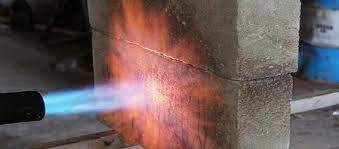Concrete is a composite material made up of water, cement, aggregates and additives. The melting point of concrete depends on several factors.
The melting point is called the moment when the solid changes state to liquid.
Some claim that there is no melting point for concrete because its composite materials fail before reaching that specific stage. Let's look at the factors to consider.


The behavior of concrete composite materials
Concrete materials have different melting points. Therefore, the argument that there is no melting point could be correct.
- Quartz sand melts at 1650 0 C
- The cement melted at around 1550 0 C
- Limestone decomposed at around 825 0 C
- Granite melts at around 1260 0 C
- Limestone melts at around 2570 0 C
It has also been shown that concrete exposed to fire ruptured before it began to melt due to lack of adhesion. Detachment of material could be the reason why other material reaches its melting point, which could be the main reason.
From this perspective, it can be said that there is no melting point for concrete.


This is how we evaluate the melting point of concrete
When the temperature of concrete reaches about 800°C, 0 C and if it continues to rise, decomposition of the concrete may occur. This is something like Peeling of concrete due to corrosion of reinforcement.
Concrete in the deck area begins to separate when continuously exposed to fire. Due to the bonding effect with the reinforcement, the concrete remains adhered to the reinforcement above and at the same height as the reinforcement most of the time.
The reinforcement tends to separate and chip the concrete. Additional increases in temperature, producing Reinforcement significant loads on the floor, etc. can cause failure of panels exposed to fire from below.
Even in these cases, the concrete does not melt and fails before reaching the expected melting point.
Based on these measurements, it can be said that practically no meeting points are observed due to the behavior of the composite materials in the concrete structure.
Additionally, we conclude with an open-ended answer to the question “What is the melting point of concrete?”

